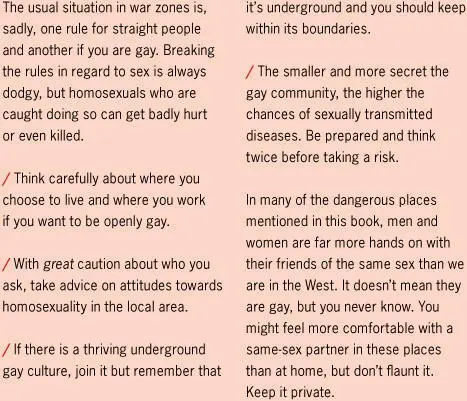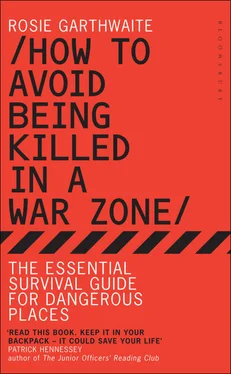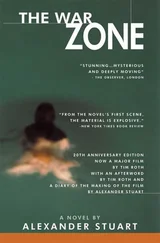
For safety, eat local. Do not eat crudités or salads in the Sahara.
Mary O’Shea
8/ Avoiding Trouble in Sex, Love and War
Joking and laughing is very important. Don’t take your work too seriously. It doesn’t pay to panic.
Zeina Khodr
I don’t know whatit is about danger, but it seems to make everyone horny. Beautiful sunsets, oysters and booze are an aphrodisiac for some. But put someone’s life on the line, surround them with others under the same pressure and bang – you have a recipe for a sexual explosion.
It might be 55° Celsius and the air con’s not working. You might not have washed for a week. You ran out of toothpaste a month ago. But none of that matters. And just like that, you are suddenly in a lot more trouble than you were before the cravings kicked in.
Sometimes, of course, craving has nothing to do with it – at least for female journalists. Jane Dutton told me: ‘It is amazing how many men will try to make a move on you – even politicians and bigwigs. When I first started out, people I grew up watching on television, 40 years older than me, were suddenly groping my leg. It made their colleagues resent me. It is hard learning how to put these men in their place and retain relationships on a professional level.’
HOMOSEXUALITY

In Baghdad after the war people were hopping from bed to bed like rabbits in springtime. There were no rules, and even less judgement at play. The place was lawless, and for a small but hardcore minority, so was the bedroom. One neighbour of mine was managing to juggle two girls on the same floor of our (very small) hotel. I thought that was quite impressive until we went to a party at a nearby hotel and another girl sat on his lap while he talked about his girlfriend back home. I met good wives and husbands who kept their wedding rings hidden away. And men and women who threw long-held sexual identities out of the nearest hotel window. They were gay for a day or a month… Offers you wouldn’t give a thought to at home can seem suddenly sexy when dressed in danger.
The obvious reasons for having sex in the wider world are amplified in a dangerous place. Popular science might explain it as your adrenalin-pumped body wanting a last chance to procreate. But having carried out a highly unscientific study amongst my friends, I would say that comfort and boredom are the principal factors motivating sex. Life anywhere away from home can be lonely, and the desire to be included, to be a part of something, draws many into bed. You might be under a lot of stress, finding it hard to sleep. Sex, and just plain human touch, will help some people deal with those pressures. Then there are the sexual scoundrels who look forward to time away from home to add a little something extra to their otherwise faithful relationships.
Monique Nagelkerke advises: ‘Don’t screw with the crew. Flirt with the same gender; it’s exciting and there’s no risk of anyone getting pregnant. And don’t worry about being embarrassed: when you leave the country you most likely will never meet up again.’
When time is precious and you are surrounded by danger, disaster and death, very little thought is given to the consequences of having sex. It’s awful to think of asking your devout Muslim translator to buy you some condoms, but how much worse would it be to ask him to buy you a pregnancy test? Unfortunately, all too often, casual sex in war zones leads to broken hearts and broken marriages.
My friend Shadi Alkasim has a simple solution: ‘It’s very hard to have sex in conflict areas, especially in Arab and Islamic countries. Customs and traditions there may put your life at risk if you have sex. My advice is to masturbate.’
Alcohol and drugs are often freely available – even encouraged – in a war zone. However, too much of either will lead to trouble. I have seen many a girl and boy ruined by one vodka too many. I have been amongst them. At one point my best friend even boycotted looking after me at parties. A killer shot would tip me over into monster mode. I learnt my lesson the hard way – via a few panicky morning-after pills, lost friendships and lost boyfriends – so I am now hyper-cautious about overdoing the booze in professional or dangerous situations.
Where there is danger, though, bravado follows. War zone junkies with years of experience writ on their faces will tell you to have another drink and ‘forget the curfew’, the underlying message being that you should join in the naughtiness in order to be part of the gang. Me and my gang at the Baghdad Bulletin did exactly that one night and were shot at twice on our screaming rush home in the early hours of the morning. We were breaking the law and no one would have been too sympathetic if we’d been killed. ‘I would never have done that,’ people would say. But the thing is, they would, and do.
Drinking competitions when you’re knackered, just returned from the field, see you pitted against burly cameramen and security guards. The competition? To prove you’re able to live on the edge and survive to tell the tale. People don’t just drink, they inhale. Individuals spend thousands of dollars on illicit alcohol and other mind-enhancing substances ‘to help them sleep’. It doesn’t work. And no one remembers why you had 30 shots before you collapsed in the hotel lobby – they’ll just remember the humiliating sight of you in a puddle of your own vomit.
So, at the risk of sounding like your mother, you have two choices if you want to remain sane and safe and out of the wrong people’s beds. Say no or find a way to minimize the impact of the booze:
• Eat a mouthful of food for every unit of alcohol.
• Drink a glass of water between each drink.
• Make sure the regular barman knows to make every third vodka and tonic without any vodka when the orders go up to the bar.
Of course, this is often a taboo subject, or maybe just overlooked. Sexual health is probably the last thing on your mind as you head off to a dangerous place. But if you’re there for a while and find yourself running out of contraceptive pills or landing in some sort of sexually related trouble, it will be the only thing on your mind. Finding someone to help you will be more difficult out there than anywhere else in the world. Asking advice from the wrong doctor could put you in front of a judge, facing the harsh local laws before you’ve had time to say ‘condom’.
Helen Asquith is a London-based doctor working towards a career in international public health. She has travelled widely, observing doctors and hospitals around the world. Her streetwise view of medicine led me to ask her to write some advice on sexual health in dangerous places. Some of the advice below is a little unorthodox because it is aimed at solving problems when there are no professional solutions around. If you have access to medical help, though, you should always consult a doctor about any sexual health problems as soon as possible.
/PREVENTING SEXUALLY TRANSMITTED DISEASES (STDs)
High rates of sexually transmitted infections and war zones go hand in hand. There are two main methods to stop infection in the first place:
Abstinence – former US President George W. Bush advocated this for Africa, but it’s not always feasible.
Читать дальше






![Джонатан Димблби - Barbarossa - How Hitler Lost the War [calibre]](/books/385421/dzhonatan-dimblbi-barbarossa-how-hitler-lost-the-w-thumb.webp)







